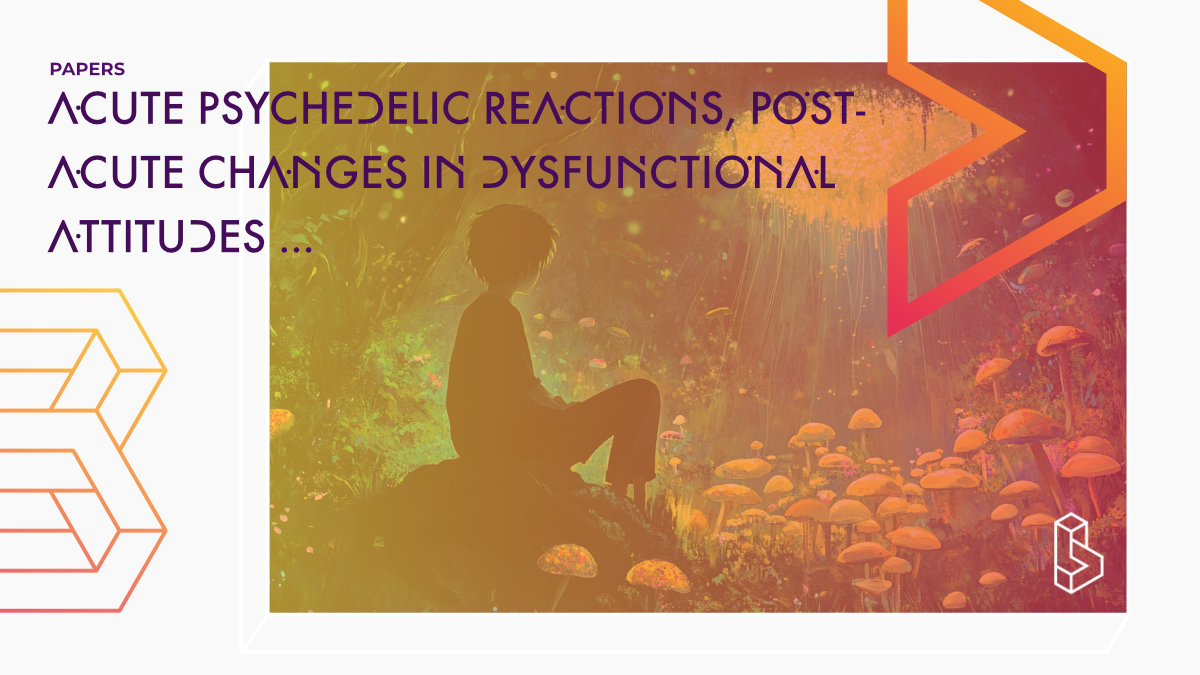This survey study (n=457) explores the relationship between dysfunctional attitudes and well-being in the context of psychedelic-assisted therapy. It finds that post-acute changes in these attitudes significantly influence well-being, with emotional breakthroughs having a greater impact than challenging or mystical experiences.
Abstract of Acute Psychedelic Reactions, Post-Acute Changes in Dysfunctional Attitudes, and Psychedelic-Associated Changes in Wellbeing
“Dysfunctional attitudes – a cornerstone to cognitive psychotherapy – vary with both psychological and pharmacological interventions. Post-acute changes in these cognitions appear to covary with the acute reactions to psychedelics that often precede improved outcomes. An examination of post-acute changes in dysfunctional attitudes could support targeting them in psychedelic-assisted therapy. Screened participants (N = 400+) reported the acute, subjective experiences associated with their most significant psychedelic response as well as post-acute changes in dysfunctional attitudes and subsequent alterations in wellbeing. Dysfunctional attitudes, emotional breakthroughs, and challenging experiences accounted for significant, unique variance in wellbeing. The effects of dysfunctional attitudes generally exceeded those of acute reactions. Comparisons among those acute responses revealed that the effect of emotional breakthroughs exceeded challenging experiences, which exceeded mystical experiences. Nevertheless, the indirect effects through post-acute changes in dysfunctional attitudes did not account for all the impact of acute effects nor interact with them. These results emphasize the import of both acute and post-acute reactions, suggesting that strategies for optimizing each might maximize outcomes for psychedelic-assisted interventions. Furthermore, standard cognitive interventions that alter these cognitions could combine with psychedelics in straightforward ways. The results also support the use of multiple multivariate approaches to address the relative importance of multicollinear predictors.“
Authors: Mitch Earleywine, Genevieve S. Falabella, Alyssa B. Oliva & Fiona Low
Summary of Acute Psychedelic Reactions, Post-Acute Changes in Dysfunctional Attitudes, and Psychedelic-Associated Changes in Wellbeing
The introduction of the article establishes the connection between dysfunctional attitudes and psychedelic-assisted therapy (PAT). Dysfunctional attitudes, defined as rigid and overgeneralised thoughts about oneself, others, and the future, are central to cognitive psychotherapy. The authors highlight that both psychological and pharmacological interventions can influence these attitudes, suggesting that examining post-acute changes in them could enhance outcomes in PAT. The authors note that acute psychedelic experiences often precede improvements in wellbeing, leading to the hypothesis that changes in dysfunctional attitudes may serve as a mediating factor in these therapeutic processes.
The authors argue for the importance of integrating classical cognitive models into PAT, pointing out that the existing literature has largely overlooked the role of dysfunctional attitudes in psychedelic research. They reference historical perspectives, noting that both Stoic philosophy and modern cognitive theories have long recognised the impact of cognitive distortions on mental health. By drawing on this extensive background, the authors aim to frame their investigation of how acute psychedelic experiences—such as emotional breakthroughs and mystical experiences—affect dysfunctional attitudes and overall wellbeing.
Method
Participants
Find this paper
https://doi.org/10.1080/02791072.2024.2421892
Paywall | Google Scholar | Backup | 🕊
Cite this paper (APA)
Earleywine, M., Falabella, G. S., Oliva, A. B., & Low, F. (2024). Acute Psychedelic Reactions, Post-Acute Changes in Dysfunctional Attitudes, and Psychedelic-Associated Changes in Wellbeing. Journal of Psychoactive Drugs, 1-10.

